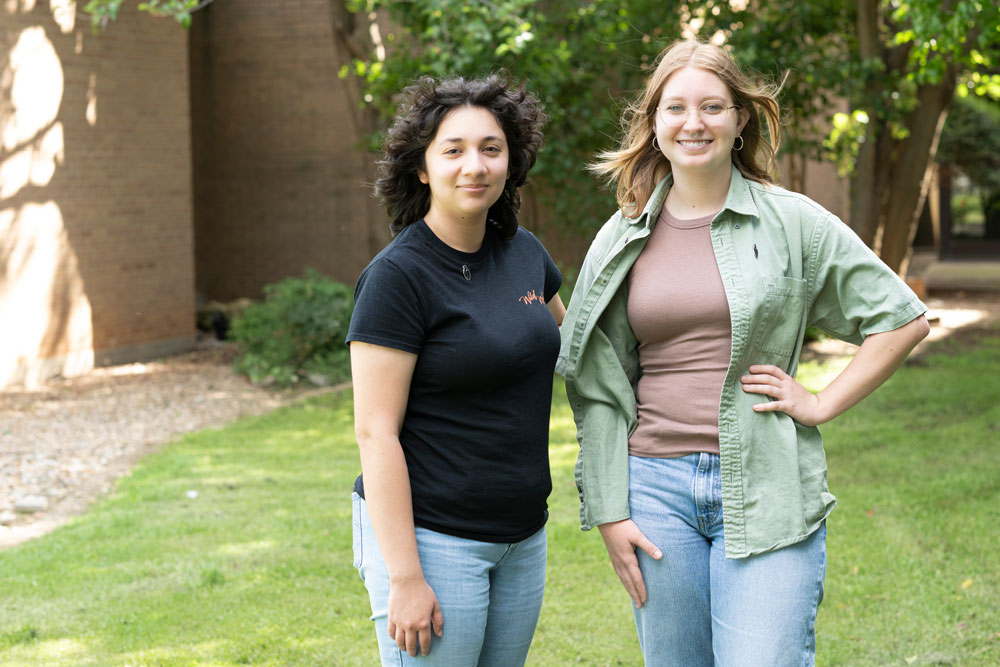At the heart of UNT’s Discovery Park, in a tucked-away courtyard, black vulture couples have quietly made their home for over a decade. Now, thanks to a passionate group of student ecologists and faculty mentors, the world can watch them live.
The Discovery Park Black Vulture Camera Project launched in Spring 2024 as the brainchild of the UNT Bird Campus Committee, backed by funding from the We Mean Green Fund and the Audubon on Campus program. Dr. Jaime Baxter-Slye, clinical assistant professor of ecology education and faculty advisor for the Bird Campus Committee, and Bonnie Banks, Marketing Specialist in Facilities, are co-mentors for the project and collaborated on the idea. The initiative installed two weatherproof cameras to monitor the black vulture family — longtime residents of the space. They’ve been documented since 2012, but reports from long-term employees say they have seen the nest for at least 22 years.
“The black vultures have been there as long as anyone can remember,” says Baxter-Slye. “I think the building design, with its low profile and hidden garden spaces, created an ideal nesting spot.”
 Baxter-Slye’s Ecological Action Studio lab fosters projects like this, giving students hands-on experience in conservation
and community engagement. For senior ecology majors Ashley Giron (pictured, left)
and Mack Davis (pictured, right), co-leads on the project, the vultures represent
both an ecological opportunity and a public relations challenge.
Baxter-Slye’s Ecological Action Studio lab fosters projects like this, giving students hands-on experience in conservation
and community engagement. For senior ecology majors Ashley Giron (pictured, left)
and Mack Davis (pictured, right), co-leads on the project, the vultures represent
both an ecological opportunity and a public relations challenge.
“We’re really wanting to engage the community,” Davis says. “Most people look at vultures and they’re like, ‘Oh, they eat dead things, they’re gross.’ So, with the cameras and the public being able to view this on their own, our hope is that it changes their opinion of them.”
The nest contained two eggs that hatched in mid-April. The livestream will document the chicks’ journey until they fledge in July. The team will promote the camera on social media and at tabling events, and host a naming contest on their Instagram — last year’s hatchlings, born during the solar eclipse in April 2024, were aptly named Solar Eclipse and Lunar Eclipse.
Beyond cute chicks and a fun livestream, the project carries deeper ecological significance. “Birds are a good indicator species for ecosystems,” Giron explains. “If they keep returning to this environment, that shows it’s functioning well.”
Black vultures (Coragyps atratus) are monogamous scavengers protected under the Migratory Bird Treaty Act of 1918. While not endangered, they often suffer from poor public perception.
“These are the birds you see on the sides of the road,” Davis says. “But they’re doing an important job. They help clean up dead animals and prevent the spread of disease.”
Monitoring the vultures also offers students leadership and research experience. Though no formal study is underway yet, Davis and Giron say that could change. “It’s a legacy project. Each year, new students can step in, take ownership and keep the work going,” says Giron.
The idea began simply. “Dr. Slye was made aware of the vultures at Discovery Park,” Giron recalls. “And then she and Bonnie were like, ‘Wouldn’t it be cool if we had cameras?’ So, we realized we could apply for the We Mean Green Fund and make it happen.”
The students applied for two grants: one from UNT WMGF and one from Audubon on Campus. They were awarded both grants of $5,748 each, which they used to purchase two cameras and a set of signs.
Installation began on Feb. 14, 2025, with the cameras fully operational by Feb. 25 — just in time for nesting season. The team researched other institutions’ setups, including Cornell’s renowned bird cams, and outfitted the space with weatherproof equipment purchased from All Campus Security.
Once they secured technology to host the stream, the livestream of the nest was launched on YouTube on April 10, almost exactly a year after the previous chicks were born.
For the students behind the project, it’s about more than just technology or birds.
“I’ve watched so many UNT students over the years take initiative on projects and do unbelievable things, like raise money for their own special projects,” Baxter-Slye says. “I think the real sense of pride just comes from watching them ask the questions of how to even write a grant proposal, how to present it and go through that entire process to have success and see that final project.”
As for what’s next after they graduate, both Giron and Davis hope to continue working with birds, possibly through graduate school and research. “I’d love to do something bird-related,” Davis says. “I’m still figuring it out, but this project has definitely shaped that.”
“After I graduate, I do want to go to grad school and work toward a Ph.D. and become an ornithologist, studying birds and becoming a professor at some point,” Giron says.
In the meantime, these two chicks at Discovery Park have an audience — and a whole team of advocates — watching them grow.